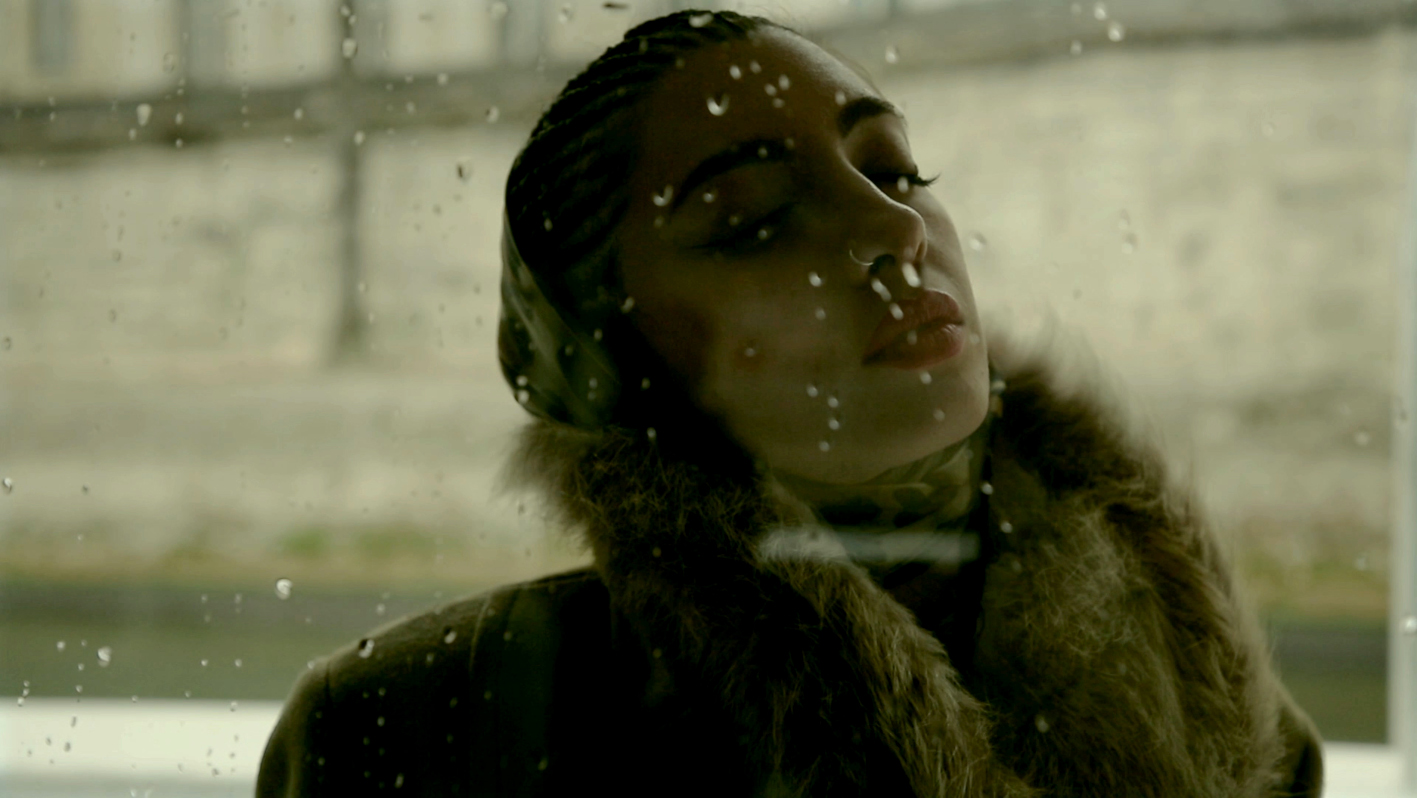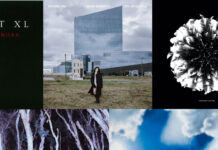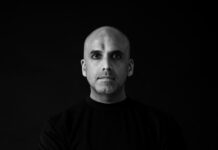Photo: Press (Sadaf)
A quick glance on Resident Advisor will tell you that the artists that Sadaf H. Nava shares the stage most often with Eartheater and Yves Tumor. That makes sense not because their respective music sounds much alike, but they all share a certain methodology: much like Alexandra Drewchin or Sean Bowie, the solo work of Sadaf aims equally for evoking physical and emotional reactions while it is also abstract and conceptual. With her EP Shell and her recent debut LP History of Heat on FaltyDL’s Blueberry imprint, the violinist and composer follows an idiosyncratic approach to storytelling that goes beyond only sound art. Sadaf’s mix for our Groove podcast is equally curious – constantly shushing itself whenever it gets too extreme.
Before focusing on your work as a solo artist, you have released music together with Mélissa Gagné – aka Babi Audi or Cecilia – and amongst other things contributed as a lyricist to Marie Davidson’s Perte d’Identité. How and why did you decide to pursue a solo path as Sadaf?
It’s always been very natural for me to work alone and I have always done it in a way. I felt like kind of a loner until my twenties… Even now I sometimes feel very isolated, which can be positive in its own way. It serves as a form of introspection that allows me to connect with myself. Working solo is for me a type of therapy. I think that the music I make is very personal, I record in my bedroom with a simple set-up, sometimes composing in bed, and this informal way of working hopefully gives an intimate quality to the music. In another sense, making music for me is like keeping a diary, and I don’t mean diary in an autobiographical sense, because I work with stories, but when I listen back to a song I made years ago, I myself know exactly in what context I wrote it. It helps to anchor certain moments in time like a photograph can. That being said, I find it super freeing and exciting to collaborate with friends and people whose work I respect like Mélissa and Marie and I hope to do it more in the future. I would also love to one-day compose for an orchestra, or a choir, even dancers – why not! – and to work with larger production teams for live performances.
Your debut EP Shell thematically dealt with a filmmaker who burns her script and is also told from the perspective of her characters. „To me this isn’t even music, it’s more a series of images and moods described through sound and rhythm,“ you said at the time of its release. Why then did you choose to approach the sujet with music anyhow, as opposed to the medium that it deals with – film?
I think it’s more interesting for people to imagine this film with the absence of Images; it gives the listener a more active and imaginative role. For that reason, I didn’t release any music videos or moving images attached to that album. It is all about a Shell or remaining skeleton of something burnt out or destroyed. I think it is difficult to talk about a medium using the medium itself as transmission. I feel I can express this abstract cinematic quality better through sound. The second reason is that it was absolutely impossible for me to make a feature length film at the time so all that was left was a desire to do so, and that desire was transposed to music. I hope to make a feature length film in the future, but for Shell, it was more about the idea of failure rather than filmmaking. The failure to do something one wants to do – like a kind of creative impotence. When I composed that album, It was a time of self-doubt for me and a momentary lack of confidence. It was a time when I wanted to destroy everything I’ve made and become another person with a new identity. But of course I had to make this album so that struggle became a thematic or blueprint for the whole thing. So in some ways the failed filmmaker tearing up the script and even the characters can be seen as different aspects of myself. The third reason would be that I really don’t make much of a distinction between different disciplines. I don’t think it changes much. Maybe it would change the audience, but in terms of content, the aesthetic, mood and intention would stay the same. To me it makes no difference if I work with images or sound or paint. The important thing is that the work is coming from me. I also believe that an artist doesn’t necessarily have to create any work to be an artist…
History of Heat, your debut LP released on FaltyDL’s Blueberry Records earlier this year, also takes some cues from cinema but is essentially a story about both love and personal growth. While both love and eroticism are common, if not the essential themes in pop and dance music, they are only rarely approached through the lens of experimental music. What drew you to those topics, specifically?
Life drew me naturally to these topics I think, as early as I was able to grasp them. You are right about this current phobia around these themes outside of the mainstream. I think it is a shame, that similarly in contemporary art and experimental music, people are afraid to approach this kind of subject matter out of fear of seeming uncool or trite – not everyone of course, but I would say it is rare. To me the themes of love and eroticism are extremely important, complex and pertain to almost everyone. The fact that “serious” discourse does not often touch the subject of “love” is I think because it is something that is hard to define and extremely painful to talk about so it inspires great works and propels and motivates people more than it is tackled directly. We can say that everything is about love already. Okay, maybe I’m going to far… It doesn’t even mean anything: love… It means nothing and everything. Personally, I place it close to the divine because it rests entirely on faith. Love can only exist if you believe in it, even subconsciously. The way that the mainstream talks about love to me is a sort of propaganda. It’s a formula largely propagated by Hollywood films and It feels like eating too much candy and you leave the theatre and you feel sick and manipulated… And sometimes that’s fun! As a teenager I understood very quickly the weight and sustenance that love stories can have when they are told in a complex way. I remember dragging my mom with me to the Pacific Cinemateque in Vancouver to watch Rivette’s film L’Amour Fou, which is a four-hour slow destruction of a relationship. And I was blown away by it. I thought, this is what life is actually like! Even the power of a Flaubert novel or Bergman’s Scenes From A Marriage, or Cassavetes saying in an interview “I have a one-track mind, that’s all that I’m interested in – love. And the lack of it. When it stops”. This had a very deep impact on me as a young woman. I was always fascinated by the failure or tragedy of failed relationships more than happy endings. I think to know that this idea can fail so miserably – a lot of times due to societal pressures or personal insecurities – and to still believe in it and aspire towards it is more powerful than to imagine that your life is going to be a Walt Disney film. I think children should be exposed to someone like Bergman at a very early age. (laughs)
Your violin plays a key role in both your productions and your live performances. What characterizes your relationship with this instrument and how do you approach playing it in the context of experimental and improvisational music?
I was trained classically and I remember the great burden of having to practice. I hated to practise so much. It felt like speaking through someone else’s voice. Practise or rehearsal always has this aspect of karaoke for me that I hate. So because of this little problem I had, I became the kind of musician whose work is not contingent on practice. The practice I get is on stage and through improvisation. It’s also my rebellion against “beautiful music” and the privilege of talent and craft. Improvisation is also a talent, but it is one that I think with confidence and guts many people can do, and I believe that everyone can be an artist. It more has to do with intention, improvisation is not something you can fake, because it lifts the veil off the unconscious in a way.
Another important element is your voice, of course. On tracks like „War Text“ for Nyx Unchained’s Transcendence compilation however, you layer and manipulate it in ways that for you listeners it becomes hard to understand what you are singing and talking about, however both of your records work with narratives. Which role does the voice and the lyrics you use in the general concept of those records? It at times seems as you put more emphasis on the contextual creation of meaning rather than saying things directly as a conventional song would do it.
I think it’s a mix. I like words and poetry and lyrics very much, but I also like the abstraction of the voice, when it becomes an instrument to be manipulated, or a texture. I think also going in and out of legibility plays with the desire of the listener. I personally love music that I don’t understand. I listen mostly to music in other languages and a lot of times I prefer to just get the mood and the texture of the words… And other times I’m so moved by the feeling that I have to Google translate the lyrics… And I’m rarely disappointed! I think it engages the mind to have to invent meaning where meaning is not accessible to us. I also sometimes have this urge to democratise the voice amongst the other instruments. To say, “You are not that important! We can do without you… Go to the back!“ (laughs) I don’t want to make the voice a dictator that rules over the instrumentals. I want to give the different elements an equal footing to be heard.
While you don’t primarily work as a DJ, you occasionally program shows for Rinse FM. What’s important to you when putting together shows like that and what was the idea behind your contribution to the Groove podcast?
My mixes have become more personal and more indulgent. I never really cared about DJ trends and I have such a messy and broad curation for these things to begin with, but recently I find I am even more inhibited with the things I include. At times they can be soundscapes, a notebook of quotes with hardstyle next to something your gramma would listen to. But it’s really not planned, I give myself absolute freedom to put in whatever I am enjoying at the moment. For the mix I made for the Groove podcast I was imagining that every time special attention was needed, things would get too loud or too weird there would be someone who says “Shhh…,” I thought it was funny to have a mix that would Shushhh itself… Kind of like having a laugh track that says “Pay attention here!” or “Slow down!”… Or to have an annoying critic that accompanies you throughout. The mix starts with the voice of Gena Rowlands in Love Streams layered with the opening sequence of one of my favorite films La Luna by Bertolucci and the famous Maria Callas interpretation of Tosca: “Vissi D’Arte, Vissi D’Amore…” “I lived in Art, I lived in Love…”
Last but not least: Where can we see you perform in the near future and what are your plans as a producer?
I am in the process of putting together my Fall European tour, so look out for that in October! I will also be performing at Market Hotel in Brooklyn Sep 6th with Liturgy and Deli Girls.
Stream: Sadaf – Groove Podcast 222
01. Gena Rowlands excerpt from Love Streams (John Cassavetes)
02. Opening sequence of La Luna (Bernardo Bertolucci)
03. Maria Callas – Tosca – Vissi D’Arte
04. Miyagi & Эндшпиль feat. Рем Дигга – I Got Love
05. 21st Century Dreams – Calling Out Artists
06. Gambi – Hé oh
07. Park Hye Jin – I DON’T CARE
08. Charles Mingus – Goodbye Pork Pie Hat
09. Baran – Be Jahanam
10. DJ Blyatman & Russian Village Boys – Instababe
11. Mala Rodriguez – Gitanas
12. Mihâly Vig -The Turin Horse OST
13. Disco Halal – Hamathil
14. Skylover – Пьяная
15. Wally Seck – Begleen
16.Tandem feat. Diam’s, Faf La Rage, Lino, Kazkami, Kery James, El
Tunisiano-Le Judgement
17. Faithless –Drifting away
18. Gaia Beat – Desarruma (feat Staff Paulo & Mestre Sedrick)
19. John Coltrane – in a sentimental mood
20. BBE – 7 days and one week
21. MONS – Labass ft Flenn
22. Randy Dandy-O Assassin’s Creed IV Black Flag
23. Kalibwoy, Jhorrmountain, Kempi – Curadise ft. Dezz
24. Timal – La 11
25. Pyramids x 3robi – Rwina
26. Excerpt from Sokout by Mohsen Makhmalbaf
27. Nada – Il cuore è uno zingaro
28. Nothing Else Matters by Metallica – Danish Guitar Performance – Soren
Madsen





